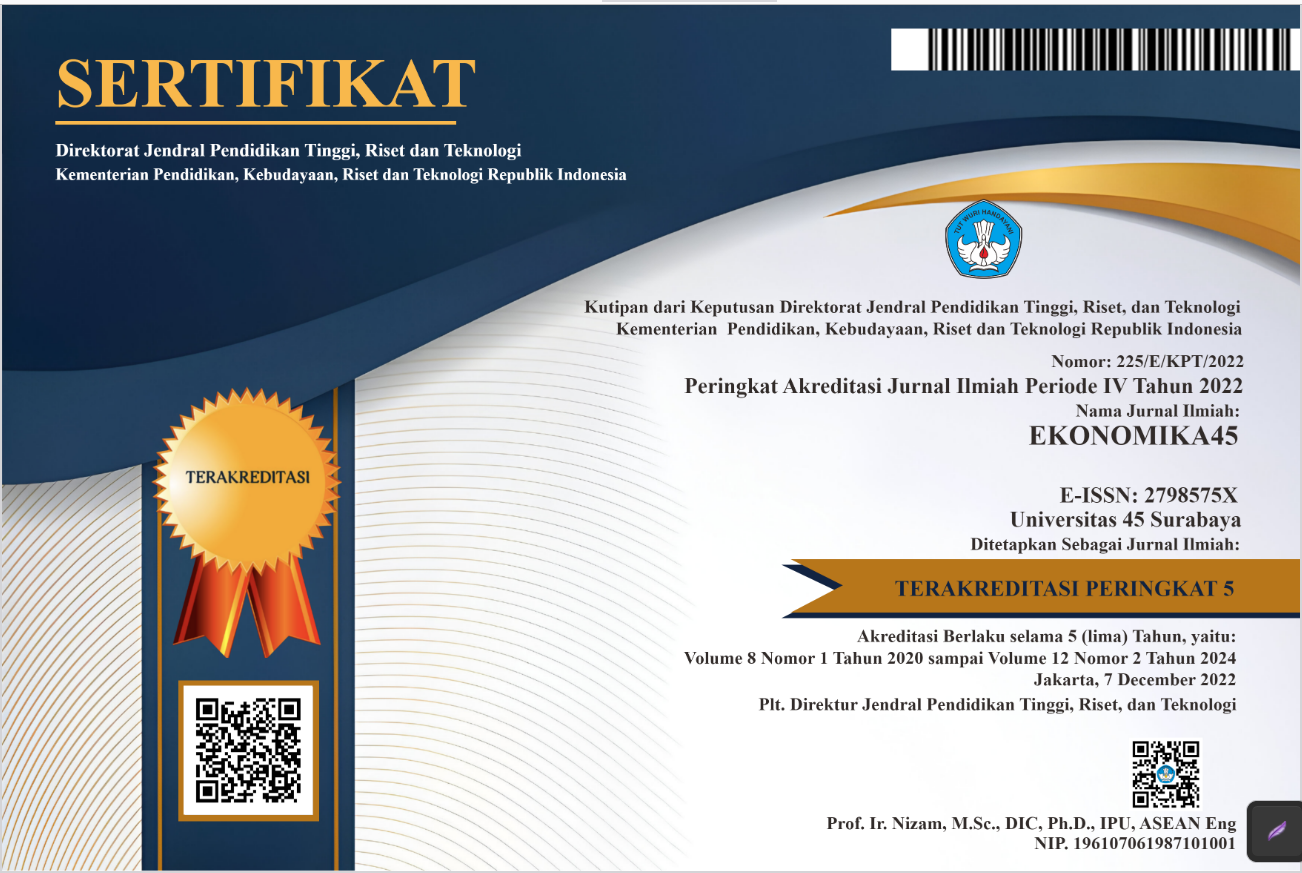Pengaruh Implementasi Green Accounting, Material Flow Cost Accounting dan Environmental Performance terhadap Sustainable Development
DOI:
https://doi.org/10.30640/ekonomika45.v12i2.4140Keywords:
Green Accounting, Material Flow Cost Accounting, Environmental Performance, Sustainable DevelopmentAbstract
This study was conducted with the aim of examining the effect of green accounting implementation, material flow cost accounting and environmental performance on sustainable development. The population of this study were 26 palm oil companies listed on the IDX for the period 2020-2023 and the total sample collected from the purposive sampling method was 15 companies with 60 observation data. The data used is secondary data with the analysis carried out including descriptive statistics, panel data regression and hypothesis testing in the form of t test, F test, and coefficient of determination analyzed using the eviews version 12 application. The results of the research conducted explain that green accounting and environmental performance partially have no effect on sustainable development, while material flow cost accounting partially affects sustainable development. Meanwhile, if the F test is carried out, then green accounting, material flow cost accounting and environmental performance simultaneously affect sustainable development.
References
Angi, Y.F. (2024) ‘Perlakuan Akuntansi Karbon Pada Perusahaan Sektor Consumer Non Cyclicals Di Indonesia’, Jurnal Akuntansi: Transparansi dan Akuntabilitas, 12(2), pp. 88–98.
Aziz, Z.R. and Kholmi, M. (2024) ‘Pengaruh Green Accounting Dan Corporate Social Responsibility Terhadap Profitabilitas’, JEAM, 23(1), pp. 54–63.
Damayanti, R.S. and Harti Budi Yanti (2023) ‘Pengaruh Implementasi Green Accounting Dan Material Flow Cost Accounting Terhadap Sustainable Development’, Jurnal Ekonomi Trisakti, 3(1), pp. 1257–1266. Available at: https://doi.org/10.25105/jet.v3i1.16014.
Dianty, A. and Nurrahim, G. (2022) ‘Pengaruh Penerapan Green Accounting dan Kinerja Lingkungan Terhadap Kinerja Keuangan’, Economics Professional in Action (E-Profit), 4(02).
Hariadi, S. and Nurwanda, R.M. (2024) ‘Pengaruh Carbon Emission Disclosure (Ced), Corporate Social Responsibility (Csr), Dan Green Accounting Terhadap Nilai Perusahaan Dengan Profitabilitas Sebagai Variabel Intervening’, Jurnal Lentera Bisnis, 13(2), p. 714. Available at: https://doi.org/10.34127/jrlab.v13i2.1053.
Hindriani, R. et al. (2024) ‘Penerapan Green Accounting dan Material Flow Cost Accounting terhadap Sustainable Development’, 4, pp. 845–854.
Kurnianingtyas, I. and Trisnawati, L.P.P. (2024) ‘Pengaruh Green Accounting, Material Flow Cost Accounting, Dan Environmental Performance Terhadap Sustainable Development’, Jurnal Penelitian Ekonomi Akuntansi (JENSI), 8(2), pp. 302–317.
Marota, R. (2017) ‘Green Concepts and Material Flow Cost Accounting Application for Company Sustainability’, Indonesian Journal of Business and Entrepreneurship, 3(1), pp. 43–51.
May, S.P. et al. (2023) ‘Pengaruh Implementasi Green Accounting, Material Flow Cost Accounting Dan Environmental Performance Terhadap Sustainable Development’, Owner: Riset & Jurnal Akuntansi, 7(3), pp. 2506–2517. Available at: https://doi.org/10.33395/owner.v7i3.1586.
Putra, B. and Sisdianto, E. (2024) ‘Penerapan Green Accounting Dalam Mendukung Keberlanjutan Perusahaan Di Indonesia’, Jurnal Media Akademik (JMA), 2(12).
Putri, H., Handajani, L. and Lenap, I.P. (2024) ‘Pengaruh Green Accounting, Environmental Performance, dan Material Flow Cost Accounting (MFCA) Terhadap Sustainable Development’, PERFORMANCE: Jurnal Bisnis & Akuntansi, 14(1), pp. 317–329. Available at: https://doi.org/10.24929/feb.v14i1.2873.
Rohkayati, E. and AR, R.R.S. (2024) ‘Peluang dan tantangan produksi emisi biomassa pada pabrik minyak kelapa sawit’, Prosiding Seminar Nasional Sains dan Teknologi Seri 02 Fakultas Sains dan Teknologi, Universitas Terbuka, 1(2), pp. 611–617.
Selpiyanti and Fakhroni, Z. (2020) ‘Pengaruh Implementasi Green Accounting dan Material Flow Cost Accounting Terhadap Sustainable Development’, Jurnal ASET (Akuntansi Riset), 12(1), pp. 109–116. Available at: https://doi.org/10.17509/jaset.v12i1.23281.
Downloads
Published
How to Cite
Issue
Section
License
Copyright (c) 2025 EKONOMIKA45 : Jurnal Ilmiah Manajemen, Ekonomi Bisnis, Kewirausahaan

This work is licensed under a Creative Commons Attribution-ShareAlike 4.0 International License.









